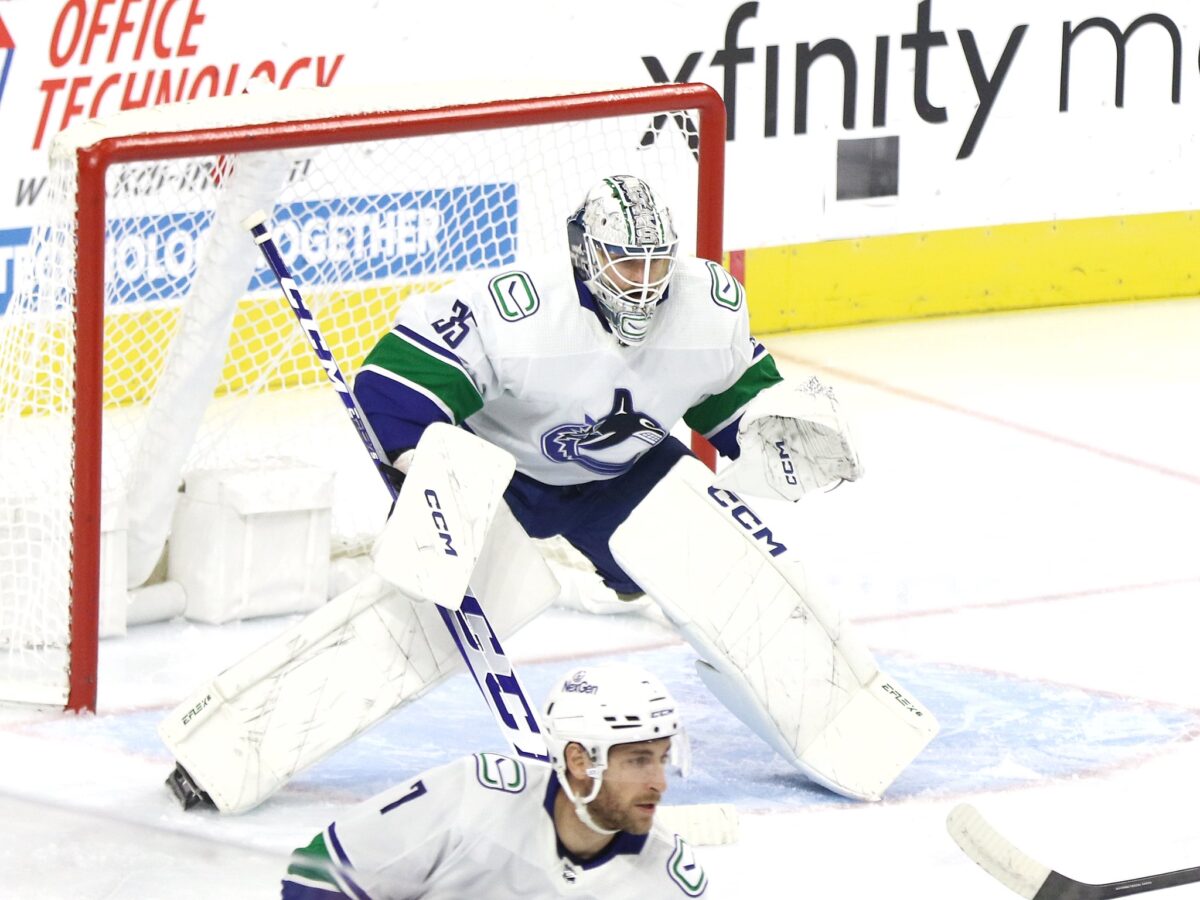As the race for the Pacific Division crown heats up between the Vancouver Canucks and Edmonton Oilers, the former’s offence has cooled off. While Rick Tocchet has his work cut out for him to get his attackers firing on all cylinders again, there is an old saying that argues that defence wins championships. Knowing that, Vancouver is still well-equipped to make a deep run in the postseason. Not only is its goaltending rock solid this season but so are its defensive pairings, who concede few opportunities to opponents.
Canucks’ Defence Rescues the Offence
On Saturday’s Hockey Night in Canada telecast of the Canucks- Los Angeles Kings matchup, a graphic was shown that put into numbers how much of a struggle it’s been for Vancouver’s offence since the NHL All-Star break. Their goals per game figure is but 2.74, good for 27th league-wide. The club has fired 28.4 shots on target in each contest, which ranks 23rd. The power play, one of those make-or-break stats in the playoffs, is clicking at 18 percent, also 23rd.
The wild thing is that for the entire campaign, the Canucks are statistically still one of the best sides in the league. Their 3.42 goals a night puts them seventh, and the power play’s 22 percent efficiency has them in 13th. It’s not as if Vancouver can’t play well or has never shown any such inclination. But they have cooled off, of that there is no doubt.
Luckily, the defence has come up huge. The obvious stat to glance at is the goals against average. Vancouver coughs up only 2.70 goals a game, a sparkling figure that ranks sixth. The issue with that – not that being seventh best is a problem – is that the goaltenders usually get the glory for that number. Thatcher Demko and Casey DeSmith have excelled this season, fully deserving of all the plaudits that come their way.

But frequently a goalie (or goalies) is only as good as the defence in front of them. What stands out when one ventures into the rabbit hole that is hockey statistics is the number of shots the Canucks allow opponents. Since the start of the season, the opposition has only managed to fire 2,203 attempts on Vancouver’s net. That might sound like a lot, but it has the B.C.-based unit ranked sixth in the entire league. Consider that the San Jose Sharks, who are last, have allowed 2,676. That’s over 400 shot attempts more. No wonder they struggle.
Quinn Hughes and Company Set the Example
Anyone who talks about Vancouver’s prowess on the blue line immediately conjures up thoughts of Quinn Hughes. The Floridian was named team captain last summer and has lived up to the billing. He’s not merely one of the better defenders in the Canucks’ lineup but among the top players in the NHL, with his name mentioned in the Norris Trophy conversation. Not only is his plus-38 for the season spectacular but he’s been an Iron Man as well, partaking in every single match thus far. Averaging more than a point per game (86 in 77 contests) helps a lot too.
Related: Canucks’ Hughes Greatest Defenceman in Franchise History
Vancouver’s roster is replete is stout defencemen. Filip Hronek is second in plus-minus with a plus-33. Tyler Myers, mid-season acquisition Nikita Zadarov, Carson Soucy (who missed a lot of action due to injury earlier this season), and Ian Cole are all good-to-great players. Cole, for that matter, is 22nd in the NHL in blocked shots with 157 as of April 8.
Consider the sort of figures the unit has put up over the past couple of weeks. On March 21 against the Montreal Canadiens, they allowed 17 shots, then 24 against the Calgary Flames, 19 versus the Los Angeles Kings, 34 to the Dallas Stars, the Anaheim Ducks got 22, the Vegas Golden Knights had 30, the Arizona Coyotes 21, and the Kings (again) had 29 this past Saturday night.
In eight games they allowed fewer than 30 shots six times and less than 25 attempts five times. Those are phenomenal numbers, especially since the attack has slowed down. It goes beyond alleviating the pressure on the offence. It means Demko and DeSmith – very solid netminders in their own right – don’t have to worry much about getting bombarded every night.
Is the best defence a good offence or is the best offence a good defence? Whatever the case, the Canucks are equipped for either. Remember, although the team’s attacking stats have taken a hit recently, those defensive numbers have held true all season. When the playoffs begin and the games get more intense with scoring chances at a premium, Vancouver has the personnel to handle that style of play.
